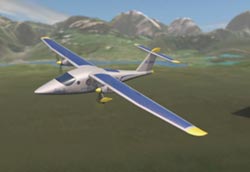EADCO and PC-Aero present at the Paris Airshow for the first time the full electric 6 seats ….

<br>
The countdown has been started for opening the gates again for the worldwide leading aviation and space event in Le Bourget, Paris from June 17th – 23rd, 2013.
EADCO & PC-Aero will present at the Paris Air Show in Hall H4 booth F-7 their new future aircraft and innovative project: Elektro E6.
The Elektro E6 is the technology platform for a future, all electric, transport aircraft. Low CO2 emission, noise and vibration: Full Carbon Composite structure, Two Electric Engines, high wing propeller, Solar Cells Technology, 6 seats, 480 kg payload & 500 km range (in 6 years).
Goals: Build a Proof of Concept in 3 years & Certification CS23 in 10 years.
The Elektro E6 will include in the final certified version, all systems of a normal commercial aircraft including retractable landing gear, anti-ice system, cabin pressure and air conditioning.
ELEKTRO E6 Project …reaching for the future!
Contact:
PC-Aero GmbH
Buchenweg 3
87484 Nesselwang /Germany
Managing Director: Calin Gologan
Phone: +49 / 8361 / 9 22 65 84
Mobile: +49 / 176 / 23 41 14 91
Mail: calin.gologan@pc-aero.de
www.pc-aero.de
EADCO GmbH
Nymphenburger STr. 3
80335 Munich/Germany
Mr. Rosario De Luca
Phone: +49 / 89 / 5521 366 0
Mail: info@eadco.com
eadco.com
Media Contact
More Information:
http://www.pc-aero.deAll latest news from the category: Trade Fair News
Newest articles

Why getting in touch with our ‘gerbil brain’ could help machines listen better
Macquarie University researchers have debunked a 75-year-old theory about how humans determine where sounds are coming from, and it could unlock the secret to creating a next generation of more…

Attosecond core-level spectroscopy reveals real-time molecular dynamics
Chemical reactions are complex mechanisms. Many different dynamical processes are involved, affecting both the electrons and the nucleus of the present atoms. Very often the strongly coupled electron and nuclear…

Free-forming organelles help plants adapt to climate change
Scientists uncover how plants “see” shades of light, temperature. Plants’ ability to sense light and temperature, and their ability to adapt to climate change, hinges on free-forming structures in their…





















